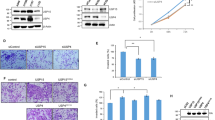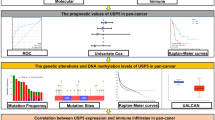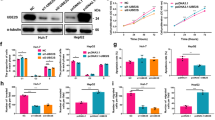Abstract
Ubiquitin is a critical modifier regulating the degradation and function of its target proteins during posttranslational modification. Here we found that ubiquitin-specific peptidase 24 (USP24) is highly expressed in cell lines with enhanced malignancy and in late-stage lung cancer clinical samples. Studying single-nucleotide polymorphisms (SNPs) of USP24 using genomic DNA of lung cancer patients revealed an increase in SNP 7656C/T. When using RNA specimens instead of the genomic DNA of lung cancer patients, we found significant increases in the ratios of variants 930C/T and 7656T/C, suggesting that variants at these two sites are not only caused by the SNP of DNA but also by the RNA editing. USP24-930T and USP24-7656C increase USP24 expression levels by increasing RNA stability. Knocking down USP24 increased Suv39h1 level through a decrease in mouse double-minute 2 homolog levels, thus enhancing lysine-9 methylation of histone H3, and resulting in the prevention of lung cancer malignancy. In conclusion, as USP24 variant analysis revealed a higher ratio of variants in blood specimens of lung cancer patients than that in normal individuals, USP24-930T and USP24-7656C might be useful as diagnostic markers for cancer detection.
This is a preview of subscription content, access via your institution
Access options
Subscribe to this journal
Receive 50 print issues and online access
$259.00 per year
only $5.18 per issue
Buy this article
- Purchase on Springer Link
- Instant access to full article PDF
Prices may be subject to local taxes which are calculated during checkout







Similar content being viewed by others
References
Heideker J, Wertz IE . DUBs, the regulation of cell identity and disease. Biochem J 2015; 467: 191.
Garg AV, Ahmed M, Vallejo AN, Ma A, Gaffen SL . The deubiquitinase A20 mediates feedback inhibition of interleukin-17 receptor signaling. Sci Signal 2013; 6 ra44.
Wang Y, Serricchio M, Jauregui M, Shanbhag R, Stoltz T, Di Paolo CT et al. Deubiquitinating enzymes regulate PARK2-mediated mitophagy. Autophagy 2015; 11: 595–606.
Zhao GY, Lin ZW, Lu CL, Gu J, Yuan YF, Xu FK et al. USP7 overexpression predicts a poor prognosis in lung squamous cell carcinoma and large cell carcinoma. Tumour Biol 2015; 36: 1721–1729.
Li Y, Schrodi S, Rowland C, Tacey K, Catanese J, Grupe A . Genetic evidence for ubiquitin-specific proteases USP24 and USP40 as candidate genes for late-onset Parkinson disease. Hum Mutat 2006; 27: 1017–1023.
Wu YR, Chen CM, Chen YC, Chao CY, Ro LS, Fung HC et al. Ubiquitin specific proteases USP24 and USP40 and ubiquitin thiolesterase UCHL1 polymorphisms have synergic effect on the risk of Parkinson's disease among Taiwanese. Clin Chim Acta 2010; 411: 955–958.
Zhao B, Song W, Chen YP, Huang R, Chen K, Cao B et al. Association analysis of single-nucleotide polymorphisms of USP24 and USP40 with Parkinson's disease in the Han Chinese population. Eur Neurol 2012; 68: 181–184.
Chiba T, Saito T, Yuki K, Zen Y, Koide S, Kanogawa N et al. Histone lysine methyltransferase SUV39H1 is a potent target for epigenetic therapy of hepatocellular carcinoma. Int J Cancer 2015; 136: 289–298.
Wu PC, Lu JW, Yang JY, Lin IH, Ou DL, Lin YH et al. H3K9 histone methyltransferase, KMT1E/SETDB1, cooperates with the SMAD2/3 pathway to suppress lung cancer metastasis. Cancer Res 2014; 74: 7333–7343.
Khanal P, Kim G, Lim SC, Yun HJ, Lee KY, Choi HK et al. Prolyl isomerase Pin1 negatively regulates the stability of SUV39H1 to promote tumorigenesis in breast cancer. FASEB J 2013; 27: 4606–4618.
Bosch-Presegue L, Raurell-Vila H, Marazuela-Duque A, Kane-Goldsmith N, Valle A, Oliver J et al. Stabilization of Suv39H1 by SirT1 is part of oxidative stress response and ensures genome protection. Mol Cell 2011; 42: 210–223.
Rebbani K, Marchio A, Ezzikouri S, Afifi R, Kandil M, Bahri O et al. TP53 R72P polymorphism modulates DNA methylation in hepatocellular carcinoma. Mol Cancer 2015; 14: 74.
Blanc V, Davidson NO . APOBEC-1-mediated RNA editing. Wiley Interdiscip Rev Syst Biol Med 2010; 2: 594–602.
Torres AG, Pineyro D, Filonava L, Stracker TH, Batlle E, Ribas de Pouplana L . A-to-I editing on tRNAs: biochemical, biological and evolutionary implications. FEBS Lett 2014; 588: 4279–4286.
Guo W, Grewe F, Mower JP . Variable frequency of plastid RNA editing among ferns and repeated loss of uridine-to-cytidine editing from vascular plants. PLoS One 2015; 10: e0117075.
Villegas J, Muller I, Arredondo J, Pinto R, Burzio LO . A putative RNA editing from U to C in a mouse mitochondrial transcript. Nucleic Acids Res 2002; 30: 1895–1901.
Blons H, Pallier K, Le Corre D, Danel C, Tremblay-Gravel M, Houdayer C et al. Genome wide SNP comparative analysis between EGFR and KRAS mutated NSCLC and characterization of two models of oncogenic cooperation in non-small cell lung carcinoma. BMC Med Genomics 2008; 1: 25.
Liu C, Rennie WA, Carmack CS, Kanoria S, Cheng J, Lu J et al. Effects of genetic variations on microRNA: target interactions. Nucleic Acids Res 2014; 42: 9543–9552.
Nicoloso MS, Sun H, Spizzo R, Kim H, Wickramasinghe P, Shimizu M et al. Single-nucleotide polymorphisms inside microRNA target sites influence tumor susceptibility. Cancer Res 2010; 70: 2789–2798.
Whibley C, Pharoah PD, Hollstein M . p53 polymorphisms: cancer implications. Nat Rev Cancer 2009; 9: 95–107.
Kramer K, Thye T, Treszl A, Peine S, Koch M, Sterneck M et al. Polymorphism in NFKBIA gene is associated with recurrent acute rejections in liver transplant recipients. Tissue Antigens 2014; 84: 370–377.
Schmid F, Burock S, Klockmeier K, Schlag PM, Stein U . SNPs in the coding region of the metastasis-inducing gene MACC1 and clinical outcome in colorectal cancer. Mol Cancer 2012; 11: 49.
Vage J, Lingaas F . Single nucleotide polymorphisms (SNPs) in coding regions of canine dopamine- and serotonin-related genes. BMC Genet 2008; 9: 10.
Tomaselli S, Locatelli F, Gallo A . The RNA editing enzymes ADARs: mechanism of action and human disease. Cell Tissue Res 2014; 356: 527–532.
Sharma S, Patnaik SK, Taggart RT, Kannisto ED, Enriquez SM, Gollnick P et al. APOBEC3A cytidine deaminase induces RNA editing in monocytes and macrophages. Nat Commun 2015; 6: 6881.
Avesson L, Barry G . The emerging role of RNA and DNA editing in cancer. Biochim Biophys Acta 2014; 1845: 308–316.
Dominissini D, Moshitch-Moshkovitz S, Amariglio N, Rechavi G . Adenosine-to-inosine RNA editing meets cancer. Carcinogenesis 2011; 32: 1569–1577.
Zhang L, Lubin A, Chen H, Sun Z, Gong F . The deubiquitinating protein USP24 interacts with DDB2 and regulates DDB2 stability. Cell Cycle 2012; 11: 4378–4384.
Zhang L, Nemzow L, Chen H, Lubin A, Rong X, Sun Z et al. The deubiquitinating enzyme USP24 is a regulator of the UV damage response. Cell Rep 2015; 10: 140–147.
Ranaweera RS, Yang X . Auto-ubiquitination of Mdm2 enhances its substrate ubiquitin ligase activity. J Biol Chem 2013; 288: 18939–18946.
Xu C, Fan CD, Wang X . Regulation of Mdm2 protein stability and the p53 response by NEDD4-1 E3 ligase. Oncogene 2015; 34: 281–289.
Zou Q, Jin J, Hu H, Li HS, Romano S, Xiao Y et al. USP15 stabilizes MDM2 to mediate cancer-cell survival and inhibit antitumor T cell responses. Nat Immunol 2014; 15: 562–570.
Honda R, Tanaka H, Yasuda H . Oncoprotein MDM2 is a ubiquitin ligase E3 for tumor suppressor p53. FEBS Lett 1997; 420: 25–27.
Shi D, Gu W . Dual roles of MDM2 in the regulation of p53: ubiquitination dependent and ubiquitination independent mechanisms of MDM2 repression of p53 activity. Genes Cancer 2012; 3: 240–248.
Yang Y, Liu R, Qiu R, Zheng Y, Huang W, Hu H et al. CRL4B promotes tumorigenesis by coordinating with SUV39H1/HP1/DNMT3A in DNA methylation-based epigenetic silencing. Oncogene 2015; 34: 104–118.
Nagahara A, Nakayama M, Oka D, Tsuchiya M, Kawashima A, Mukai M et al. SERPINE2 is a possible candidate promotor for lymph node metastasis in testicular cancer. Biochem Biophyscal Res Commun 2010; 391: 1641–1646.
Katono K, Sato Y, Jiang SX, Kobayashi M, Nagashio R, Ryuge S et al. Prognostic significance of MYH9 expression in resected non-small cell lung cancer. PLoS One 2015; 10: e0121460.
Strock CJ, Park JI, Nakakura EK, Bova GS, Isaacs JT, Ball DW et al. Cyclin-dependent kinase 5 activity controls cell motility and metastatic potential of prostate cancer cells. Cancer Res 2006; 66: 7509–7515.
Dong C, Wu Y, Wang Y, Wang C, Kang T, Rychahou PG et al. Interaction with Suv39H1 is critical for Snail-mediated E-cadherin repression in breast cancer. Oncogene 2013; 32: 1351–1362.
Das TK, Dana D, Paroly SS, Perumal SK, Singh S, Jhun H et al. Centrosomal kinase Nek2 cooperates with oncogenic pathways to promote metastasis. Oncogenesis 2013; 2: e69.
Li S, Wang L, Zhao Q, Liu Y, He L, Xu Q et al. SHP2 positively regulates TGFbeta1-induced epithelial-mesenchymal transition modulated by its novel interacting protein Hook1. J Biol Chem 2014; 289: 34152–34160.
Yanagisawa T, Kiribuchi-Otobe C, Hirano H, Suzuki Y, Fujita M . Detection of single nucleotide polymorphism (SNP) controlling the waxy character in wheat by using a derived cleaved amplified polymorphic sequence (dCAPS) marker. Theor Appl Genet 2003; 107: 84–88.
Acknowledgements
This work was supported by the National Cheng Kung University project of the Program for Promoting Academic Excellence and Developing World Class Research Centers, together with grants MOST 103-2320-B-006-035-MY3 and MOST 103-2321-B-006-023-MY3 obtained from the Ministry of Science and Technology, Taiwan. In addition, we thank the Taiwan Lung Cancer Tissue/Specimen and Information Resource Center at National Health Research Institute (NHRI), Taiwan for blood samples’ support. This Center was supported by grants from National Research Program for Biopharmaceuticals of National Science Council, Taiwan.
Author information
Authors and Affiliations
Corresponding author
Ethics declarations
Competing interests
The authors declare no conflict of interest.
Additional information
Supplementary Information accompanies this paper on the Oncogene website
Rights and permissions
About this article
Cite this article
Wang, YC., Wang, SA., Chen, PH. et al. Variants of ubiquitin-specific peptidase 24 play a crucial role in lung cancer malignancy. Oncogene 35, 3669–3680 (2016). https://doi.org/10.1038/onc.2015.432
Received:
Revised:
Accepted:
Published:
Issue Date:
DOI: https://doi.org/10.1038/onc.2015.432
This article is cited by
-
USP24-i-101 targeting of USP24 activates autophagy to inhibit drug resistance acquired during cancer therapy
Cell Death & Differentiation (2024)
-
The Wnt-pathway corepressor TLE3 interacts with the histone methyltransferase KMT1A to inhibit differentiation in Rhabdomyosarcoma
Oncogene (2024)
-
USP24 promotes drug resistance during cancer therapy
Cell Death & Differentiation (2021)
-
USP24 stabilizes bromodomain containing proteins to promote lung cancer malignancy
Scientific Reports (2020)
-
WP1130 reveals USP24 as a novel target in T-cell acute lymphoblastic leukemia
Cancer Cell International (2019)



